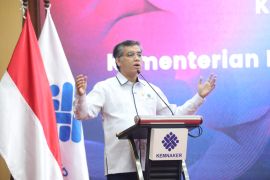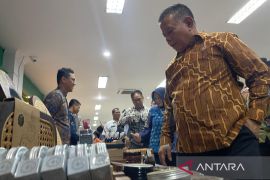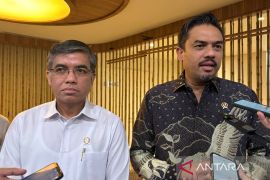Educating entrepreneurs is a lifelong learning process, starting as early as elementary school and progressing through all levels of education, including adult education.
Many experienced business people, political leaders, economists, and educators believe that fostering a robust entrepreneurial culture will maximize individual and collective economic and social success on a local, national, and global scale.
Therefore, through the Murni Sadar Foundation, PT Wilmar Group has cooperated with Bandung Institute of Technology (ITB) to develop entrepreneurship-based education.
Wilmar Group Commissioner MP Tumanggong stated on Tuesday in Bandung, West Java, that this cooperation was called for in a Memorandum of Understanding (MoU) between Murni Sadar Foundation and ITB, which was signed that day.
"With the entrepreneurship-based education, we hope students will be able to undertake critical and productive innovation, because it is the best possible long-term investment in creating qualified human resources," Tumanggong pointed out.
He noted that human resources are key to raising Indonesias competitiveness at a global level.
"The Wilmar group takes great care in the field of education to create qualified, reliable, and well-trained people who can develop this nation," he stated.
Meanwhile Murni Sadar Foundation Chairman Mutiara MKT added that the cooperation with ITB to develop the entrepreneur-based education was possible because the institute has a good reputation and has numerous achievements, both at a local and global level, to its credit.
"This is because ITB has been able to create a lot of young, creative, professional, and innovative business makers," Mutiara emphasized.
She explained that the entrepreneurship-based curriculum that will be introduced has been made in such a way so as to motivate and encourage students to become true entrepreneurs.
ITB Rector Prof Akhmaloka elaborated, saying that he welcomed the cooperation with the Wilmar group through the Murni Sadar Foundation.
"Through this cooperation, ITB will do its best to develop entrepreneurship-based education," Akhmaloka asserted.
According to Akhmaloka, entrepreneurship education is developed to prepare youth and adults to succeed in an entrepreneurial economy.
In 2009, the National Education Ministry planned to make
make entrepreneurship training part of formal school education in the country, in a move to produce school graduates possessing the entrepreneurial spirit and skills to engage in business and industrial activities in real life.
Since then, entrepreneurship has become part of the local content of school curriculum in some areas to foster young students entrepreneurial attitudes, ethical values and culture so they would be able to compete in creating job opportunities after graduating.
With the inclusion of entrepreneurship in school curricula, students are expected to be able to create business opportunities after graduating from school.
While students were always expected to graduate with good scores, they earlier did not have the knowledge of how to create business opportunities.
Therefore, the entrepreneurship-based education is expected to create graduate students who possess the spirit of entrepreneurship.
Meanwhile, contestant at the ruling Democratic Party presidential Candidate Convention Dino Patti Djalal said here on Monday that the spirit of entrepreneurship has yet to become deeply rooted in the lives of many Indonesian people.
Dino, in a press statement, said the people of the country are still in need of an injection of new values to build the mentality of the nation in the field of entrepreneurship.
The new values, according to him, are open mindedness, risk taking, networking, self confidence, innovation, and seeing the world as a market and source of strength.
According to Ciputra, the founder and chairman of Ciputra Business Group, self confidence, the spirit, and the courage to take risks are the main capital for an entrepreneur.
Ciputra has been thinking bigger and wants to redesign the country by creating thousands of entrepreneurs through the Ciputra Entrepreneurship University.
He plans to help encourage, create and mentor millions of entrepreneurs in the country by changing the countrys mindset.
President Susilo Bambang Yudhoyono had once said that students with the spirit of entrepreneurship would be able to support the nations development in the future.
The president noted that the main strategy in the improvement of the development program was the spirit of entrepreneurship, technological innovation, and peoples empowerment.
"Creating the spirit of entrepreneurship is not easy, indeed, but through various efforts - one of them is national education reform - it is possible," the president said.
But according to former Vice President Jusuf Kalla, now the chairman of Indonesian Red Cross, the spirit of entrepreneurship does not arise from formal education.
He noted that formal education did not yield the spirit of entrepreneurship, because becoming an entrepreneur originates from the strong desire of an individual who wants to begin a business.
"Frankly speaking, in my experience as a businessman I hardly ever received the spirit of entrepreneurship from formal education," Kalla stated.
Kalla pointed out that to start a business was similar to learn how to swim, because a man may know a lot about the theory of swimming, but unless he plunges into the pool to swim, he will never be a good swimmer. (*)
Reporter: Otniel Tamindael
Editor: Otniel Tamindael
Copyright © ANTARA 2014











